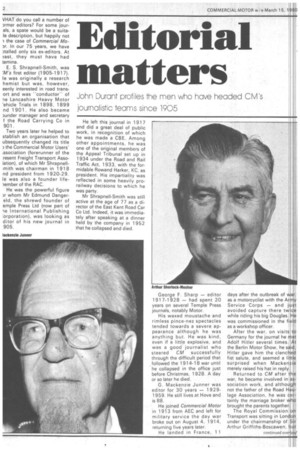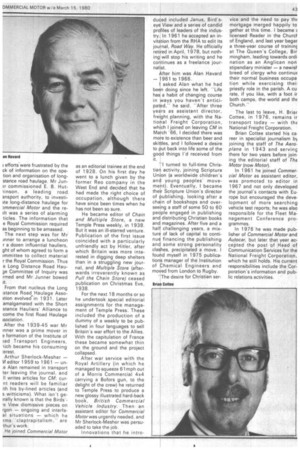Editorial matters
Page 44

Page 45

If you've noticed an error in this article please click here to report it so we can fix it.
John Durant profiles the men who have headed CIV's journalistic teams since 1905
VHAT do you call a number of )rmer editors? For some jourals, a spate would be a suitele description, but happily not .1 the case of Commercial Mo9r. In our 75 years, we have Mailed only six ex-editors. At .ast, they must have had tamina.
E. S. Shrapnell-Smith, was TM's first editor (1905-1917). le was originally a research hemist but was, however, eenly interested in road transort and was "conductor" of le Lancashire Heavy Motor 'ehicle Trials in 1898, 1899 nd 1901. He also became punder manager and secretary f the Road Carrying Co in 901.
Two years later he helped to stablish an organisation that ubsequently changed its title ) the Commercial Motor Users' ,ssociation (forerunner of the resent Freight Transport Assoiation), of which Mr Shrapnellmith was chairman in 1918 nd president from 1920-29. le was also a founder lifeember of the RAC.
He was the powerful figure )r whom Mr Edmund Dangereld, the shrewd founder of emple Press Ltd (now part of ie International Publishing :orporation), was looking as ditor of his new journal in 905. He left this journal in 1917 and did a great deal of public work, in recognition of which he was made a CBE. Among other appointments, he was one of the original members of the Appeal Tribunal set up in 1934 under the Road and Rail Traffic Act, 1933, with the formidable Rowand Harker, KC, as president. His impartiality was reflected in some heavily prorailway decisions to which he was party.
Mr Shrapnell-Smith was still active at the age of 77 as a director of the East Kent Road Car Co Ltd. Indeed, it was immediately after speaking at a dinner held by the company in 1952 that he collapsed and died. George F. Sharp — editor 1917-1928 — had spent 20 years on several Temple Press journals, notably Motor.
His waxed moustache and rimless pince-nez spectacles tended towards a severe appearance although he was anything but. He was kind, even if a little explosive, and was a good journalist who steered CM successfully through the difficult period that followed the 1 914-1 8 war until he collapsed in the office just before Christmas, 1928. A day or so later he died.
G. Mackenzie Junner was editor for 30 years — 1 9291959. He still lives at Hove and is 88.
He joined Commercial Motor in 1913 from AEC and left for military service the day war broke out on August 4, 1914, returning five years later.
He landed in France, 11
days after the outbreak of war, as a motorcyclist with the Army Service Corps — and just avoided capture there twice while riding his big Douglas. He was commissioned in the field as a workshop officer.
After the war, on visits to Germany for the journal he met Adolf Hitler several times. At the Berlin Motor Show, he said, Hitler gave him the clenched fist salute, and seemed a little surprised when Mackenzie merely raised his hat in reply.
Returned to CM after the war, he became involved in association work, and although not the father of the Road Haulage Association, he was certainly the marriage broker who brought the parents together.
The Royal Commission on Transport was sitting in London under the chairmanship of Sir Arthur Griffiths-Boscawen, but
; efforts were frustrated by the ck of information on the opetion and organisation of longstance road haulage. Mr Jun?.1commissioned E. B. Hut)inson, a leading road. 3nsport authority, to investiite long-distance haulage for )mmercial Motor and the relit was a series of alarming ticles. The information that e Royal Commission required as beginning to be amassed. The next step was for Mr inner to arrange a luncheon r a dozen influential hauliers, ght of whom agreed to form a immittee to collect material
r the Royal Commission. Thus e Long Distance Road Hauge Committee of Inquiry was rmed and Mr Junner bowed From that nucleus the Long stance Road_ Haulage Assoition evolved in 1931. Later amalgamated with the Short stance Hauliers' Alliance to come the first Road Haulage isociation.
After the 1939-45 war Mr Inner was a prime mover in a formation of the Institute of )ad Transport Engineers, -iich became his consuming :erest.
Arthur Sherlock-Mesher — VI editor 1959 to 1961 — un.e Alan remained in transport ter leaving the journal, and II writes articles for CM; curnt readers will be familiar 1th his by-lined articles (and s witticisms). What isn't gen-ally known is that the Birds''e View dismissive pieces on rgon — ongoing and interfaal situations — which he rms -claptrapitalism,' are thur's work.
as an editorial trainee at the end of 1928. On his first day he went to a lunch given by the former Reo company in the West End arid decided that he had made the right choice of occupation, although there have since been times when he has not been so sure.
He became editor of Chain and Multiple Store, a new Temple Press weekly, in 1938. But it was an ill-starred venture. Publication of the first issue coincided with a particularly unfriendly act by Hitler, after which Britain was more interested in digging deep shelters than in a struggling new journal, and Multiple Store (afterwards irreverently known as Pull the Chain Store) ceased publication on Christmas Eve, 1938.
For the next 18 months or so he undertook special editorial assignments for the management of Temple Press. These included the production of a dummy of a weekly to be published in four languages to sell Britain's war effort to the Allies. With the capitulation of France these became somewhat thin on the ground and the project collapsed.
After war service with the Royal Artillery (in which he managed to squeeze 61mph out of a Morris Commercial 4x4 carrying a Bofors gun, to the delight of the crew) he returned to Temple Press to produce a new glossy illustrated hard-back book, British Commercial Vehicle Industry. Then an assistant editor for Commercial Motor was urgently needed, and Mr Sherlock-Mesher was persuaded to take the job.
Innovations that he intro du ed included Janus, Bird'sey View and a series of candid pr lies of leaders of the industry. In 1961 he accepted an invit tion from the RHA to edit its jou nal, Road Way. He officially reti ed in April, 1978, but nothing will stop his writing and he co tinues as a freelance journal st.
fter him was Alan Havard — 961 to 1966.
I asked Alan what he had be n doing since he left. "Life has a habit of changing course
in ays you haven't anticipat d,'" he said. "After three ye rs as assistant director, freight planning, with the Nati al Freight Corporation, wh ch I joined on leaving CM in Ma ch '66, I decided there was mo e to existence than beer and ski les, and I followed a desire to ut back into life some of the go id things I'd received from it.
'I turned to full-time Christia activity, joining Scripture Un on (a worldwide children's ant young peoples' moveme t). Eventually, I became the r Scripture Union's director of ublishing, looking after a chain of bookshops and oversee ng a staff of some 50 to 60 pe pie engaged in publishing and distributing Christian books and magazines. After five and a hal challenging years, a mixtur of lack of capital to continu financing the publishing an some strong personality claltres, precipitated a move. I found myself in 1975 publications manager of the Institution of Chemical Engineers and moved from London to Rugby.
' The desire for Christian ser vice and the need to pay th( mortgage merged happily to gether at this time. I became k. licensed Reader in the Church of England, and last year begar a three-year course of traininc at The Queen's College, Bir mingham, leading towards ordi nation as an Anglican non stipendiary minister — a newisf breed of clergy who continue their normal business occupa tion while exercising theii priestly role in the parish. A cu rate, if you like, with a foot ir both camps, the world and the Church."
The last to leave, H. Briar Cottee, in 1976, remains ir transport today — with the National Freight Corporation.
Brian Cottee started his ca. reer in specialist journalism 13%, joining the staff of The Aeroplane in 1943 and serving there for two years before joining the editorial staff of The Motor (now Motor).
In 1961 he joined Commercial Motor as assistant editor, was promoted to editor in 1967 and not only developed the journal's contacts with Europe but encouraged the development of more searching vehicle test reports; he was also responsible for the Fleet Management Conference programmes.
In 1976 he was made publisher of Commercial Motor and Autocar, but later that year accepted the post of Head of Communication Services for the National Freight Corporation, which he still holds. His current responsibilities include the Corporation's information and public relations activities.
































































































































